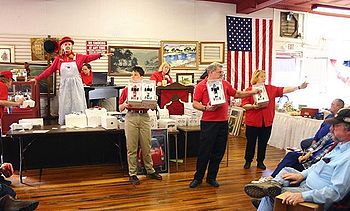Portal:Business
The Business and Economics Portal Business is the practice of making one's living or making money by producing or buying and selling products (such as goods and services). It is also "any activity or enterprise entered into for profit." A business entity is not necessarily separate from the owner and the creditors can hold the owner liable for debts the business has acquired. The taxation system for businesses is different from that of the corporates. A business structure does not allow for corporate tax rates. The proprietor is personally taxed on all income from the business. A distinction is made in law and public offices between the term business and a company such as a corporation or cooperative. Colloquially, the terms are used interchangeably. (Full article...) Economics (/ˌɛkəˈnɒmɪks, ˌiːkə-/) is a social science that studies the production, distribution, and consumption of goods and services. Economics focuses on the behaviour and interactions of economic agents and how economies work. Microeconomics analyses what's viewed as basic elements in the economy, including individual agents and markets, their interactions, and the outcomes of interactions. Individual agents may include, for example, households, firms, buyers, and sellers. Macroeconomics analyses the economy as a system where production, distribution, consumption, savings, and investment expenditure interact, and factors affecting it: factors of production, such as labour, capital, land, and enterprise, inflation, economic growth, and public policies that have impact on these elements. (Full article...) Selected articleIn economics, hyperinflation is inflation that is "out of control," a condition in which prices increase rapidly as a currency loses its value. No precise definition of hyperinflation is universally accepted. One simple definition requires a monthly inflation rate of 20 or 30% or more. In informal usage the term is often applied to much lower rates. The definition used by most economists is "an inflationary cycle without any tendency toward equilibrium." A vicious circle is created in which more and more inflation is created with each iteration of the cycle. Although there is a great deal of debate about the root causes of hyperinflation, it becomes visible when there is an unchecked increase in the money supply or drastic debasement of coinage, and is often associated with wars (or their aftermath), economic depressions, and political or social upheavals. The main cause of hyperinflation is a massive imbalance between the supply and demand of a certain currency or type of money, usually due to a complete loss of confidence in the currency similar to a bank run. First, the enactment of legal tender laws prevent discounting the value of paper money vis-a vis gold, silver or a hard currency, by forcing acceptance of a paper money which lacks intrinsic value. If the entity responsible for printing a currency then promotes excessive money printing, with other factors contributing a reinforcing effect, hyperinflation usually occurs. Often the body responsible for printing the currency cannot physically print paper currency faster than the rate at which it is devaluing, thus neutralising their attempts to stimulate the economy. Selected image
Selected economyThe economy of the Philippines is an emerging market, and considered as a newly industrialized country in the Asia-Pacific region. In 2024, the Philippine economy is estimated to be at ₱26.55 trillion ($471.5 billion), making it the world's 32nd largest by nominal GDP and 13th largest in Asia according to the International Monetary Fund. The Philippine economy is transitioning from one based on agriculture to one based more on services and manufacturing. It has experienced significant economic growth and transformation in recent years. With an average annual growth rate of around 6 percent since 2010, the country has emerged as one of the fastest-growing economies in the world. The Philippines is a founding member of the United Nations, Association of Southeast Asian Nations, Asia-Pacific Economic Cooperation, East Asia Summit and the World Trade Organization. The Asian Development Bank (ADB) is headquartered in the Ortigas Center located in the city of Mandaluyong, Metro Manila. The country's primary exports include semiconductors and electronic products, transport equipments, garments, chemical products, copper, nickel, abaca, coconut oil, and fruits. Its major trading partners include Japan, China, the United States, Singapore, South Korea, the Netherlands, Hong Kong, Germany, Taiwan, and Thailand. (Full article...) Selected quote"There is one sure mark of the coming partner, the future millionnarie; his revenues always exceed his expenditures. He begins to save early, almost as soon as he begins to earn. No matter how little it may be possible to save, save that little. Invest it securely, not necessarily in bonds, but in anything which you have good reason to believe will be profitable, but no gambling with it, remember. A rare chance will soon present itself for investment. The little you have saved will prove the basis for an amount of credit utterly surprising to you. Capitalists trust the saving man. For every hundred dollars you can produce as the result of hard-won savings, Midas, in search of a partner, will lend or credit a thousand; for every thousand, fifty thousand. It is not capital that your seniors require, it is the man who has proved that he has the business habits which create capital, and to create it in the best of all possible ways, as far as self-discipline is concerned, is, by adjusting his habits to his means. Gentlemen, it is the first hundred dollars saved which tells. Begin at once to lay up something. The bee predominates in the future millionnarie."
TopicsRelated WikiProjectsDid you know (auto-generated) -
On this day in business history
General imagesThe following are images from various business-related articles on Wikipedia.
More did you know
Business news Wikinews Economy and business portal
|






































